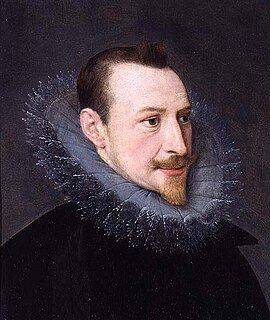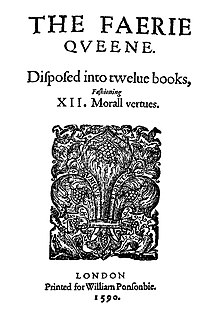
Dante Alighieri, probably baptized Durante di Alighiero degli Alighieri and often referred to simply as Dante, was an Italian poet, writer and philosopher. His Divine Comedy, originally called Comedìa and later christened Divina by Giovanni Boccaccio, is widely considered one of the most important poems of the Middle Ages and the greatest literary work in the Italian language.

Edmund Spenser was an English poet best known for The Faerie Queene, an epic poem and fantastical allegory celebrating the Tudor dynasty and Elizabeth I. He is recognized as one of the premier craftsmen of nascent Modern English verse and is often considered one of the greatest poets in the English language.

Pope Adrian V, born Ottobuono de' Fieschi, was the head of the Catholic Church and ruler of the Papal States from 11 July 1276 to his death on 18 August 1276. He was an envoy of Pope Clement IV sent to England in May 1265 who successfully completed his task of resolving disputes between King Henry III of England and his barons. Adrian V was elected pope following the death of Innocent V, but died of natural illness before being ordained to the priesthood.

The Divine Comedy is a long Italian narrative poem by Dante Alighieri, begun c. 1308 and completed in 1320, a year before his death in 1321. It is widely considered to be the pre-eminent work in Italian literature and one of the greatest works of world literature. The poem's imaginative vision of the afterlife is representative of the medieval world-view as it had developed in the Western Church by the 14th century. It helped establish the Tuscan language, in which it is written, as the standardized Italian language. It is divided into three parts: Inferno, Purgatorio, and Paradiso.

The Faerie Queene is an English epic poem by Edmund Spenser. Books I–III were first published in 1590, then republished in 1596 together with books IV–VI. The Faerie Queene is notable for its form: at over 36,000 lines and over 4,000 stanzas it is one of the longest poems in the English language; it is also the work in which Spenser invented the verse form known as the Spenserian stanza. On a literal level, the poem follows several knights as a means to examine different virtues, and though the text is primarily an allegorical work, it can be read on several levels of allegory, including as praise of Queen Elizabeth I. In Spenser's "Letter of the Authors", he states that the entire epic poem is "cloudily enwrapped in Allegorical devices", and that the aim of publishing The Faerie Queene was to "fashion a gentleman or noble person in virtuous and gentle discipline".
The Spenserian stanza is a fixed verse form invented by Edmund Spenser for his epic poem The Faerie Queene (1590–96). Each stanza contains nine lines in total: eight lines in iambic pentameter followed by a single 'alexandrine' line in iambic hexameter. The rhyme scheme of these lines is ABABBCBCC.
Narrative poetry is a form of poetry that tells a story, often making the voices of a narrator and characters as well; the entire story is usually written in metered verse. Narrative poems do not need rhyme. The poems that make up this genre may be short or long, and the story it relates to may be complex. It is normally dramatic, with objectives, diverse and meter. Narrative poems include epics, ballads, idylls, and lays.

The Castle of Iron is the title of a fantasy novella by American authors L. Sprague de Camp and Fletcher Pratt, and of the novel into which it was later expanded by the same authors. It was the third story in their Harold Shea series. As a 35,000 word novella it was first published in the fantasy magazine Unknown for April, 1941. The revised and expanded novel version was first published in hardcover by Gnome Press in 1950, and in paperback by Pyramid Books in 1962. The book has been reprinted by a number of other publishers since its first appearance. An E-book edition was published by Gollancz's SF Gateway imprint on September 29, 2011 as part of a general release of de Camp's works in electronic form. The novel has been combined with other books in the series in the omnibus editions The Compleat Enchanter (1975), The Complete Compleat Enchanter (1989) and The Mathematics of Magic: The Enchanter Stories of L. Sprague de Camp and Fletcher Pratt (2007). It has also been translated into Italian.

Mac Flecknoe is a verse mock-heroic satire written by John Dryden. It is a direct attack on Thomas Shadwell, another prominent poet of the time. It opens with the lines:

Elizabethan literature refers to bodies of work produced during the reign of Queen Elizabeth I (1558–1603), and is one of the most splendid ages of English literature. In addition to drama and the theatre, it saw a flowering of poetry, with new forms like the sonnet, the Spenserian stanza, and dramatic blank verse, as well as prose, including historical chronicles, pamphlets, and the first English novels. Major writers include William Shakespeare, Edmund Spenser, Christopher Marlowe, Richard Hooker, Ben Jonson, Philip Sidney and Thomas Kyd.

Flattery is the act of giving excessive compliments, generally for the purpose of ingratiating oneself with the subject. It is also used in pick-up lines when attempting to initiate sexual or romantic courtship.
David Lee Miller is a scholar of English Renaissance Literature. He is Distinguished Professor of English and Comparative Literature at the University of South Carolina in Columbia. His works include The Poem's Two Bodies: The Poetics of the 1590 Faerie Queen, ; Dreams of the Burning Child: Sacrificial Sons and the Father's Witness ; three edited books; and about two dozen refereed articles that have appeared in scholarly journals such as Modern Language Quarterly, English Literary History, and Publications of the Modern Language Association. He is one of four general editors of The Collected Works of Edmund Spenser, a new scholarly edition under contract to Oxford University Press.
Nationality words link to articles with information on the nation's poetry or literature.
Orgoglio is a literary character in Edmund Spenser's famous epic The Faerie Queene. He appears in the seventh canto of Book One as a beast and attacks the main character, Redcrosse, who symbolizes the ultimate Christian knight, during a moment of weakness. "Orgoglio" means "pride" in Italian. In chapter IX of Waverley, by Sir Walter Scott, the manor of Bradwardyne is compared to the castle of Orgoglio.

The Fairy Queen or Queen of the Fairies is a figure from Irish and British folklore, believed to rule the fairies. Based on Shakespeare's influence, in English-speaking cultures she is often named Titania or Mab.

"The Mathematics of Magic" is a fantasy novella by American writers L. Sprague de Camp and Fletcher Pratt, the second story in their Harold Shea series. It was first published in the August 1940 issue of the fantasy pulp magazine Unknown. It first appeared in book form, together with the preceding novella, "The Roaring Trumpet", in the collection The Incomplete Enchanter, issued in hardcover by Henry Holt and Company in 1941, and in paperback by Pyramid Books in 1960. It has since been reprinted in various collections by numerous other publishers, including The Compleat Enchanter (1975), The Incompleat Enchanter (1979), The Complete Compleat Enchanter (1989), and The Mathematics of Magic: The Enchanter Stories of L. Sprague de Camp and Fletcher Pratt (2007). It has been translated into Dutch and Italian. In 2016, the story was shortlisted for the Retro Hugo Award for Best Novella.
Gertrude Demain Hammond or Mrs. McMurdie was a British painter and children's book illustrator.
The House of Pride is a notable setting in Edmund Spenser's epic poem The Faerie Queene. The actions of cantos IV and V in Book I take place there, and readers have associated the structure with several allegories pertinent to the poem.
Alagia Fieschi, also known as Alagia di Nicolò Fieschi and Alagia di Fieschi, was the daughter of Count Nicolò Fieschi and niece of Pope Adrian V. Alagia married Moroello Malaspina in the 1280s and they had five children. In Dante Alighieri's Divine Comedy, Alagia is remembered by Adrian V at the end of his conversation with Dante as the only virtuous woman in his family whom he wishes to pray on his behalf. Alagia’s mention as the only virtuous person in her family reflects Dante’s view about Alagia's family's actions involving the Malaspina family. In addition, Alagia is celebrated by Dante through his portrayal of her as a virtuous woman whose prayer can contribute to Adrian V's journey of salvation.
Ghisolabella Caccianemico, also known as Ghislabella or Ghisolabella dei Caccianemici, was born into a noble family in Bologna, Italy of the Guelph political faction. Although her exact date of birth and death remain unknown, historical records indicate her existence during the thirteenth century. Family members include her father, Alberto Caccianemico dell'Orso, and her brother, Venedico Caccianemico, a political figure of several Northern Italian city-states. She was married to Niccolò dei Fontana, a nobleman from Ferrara.











